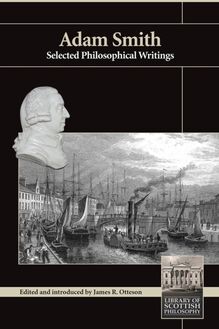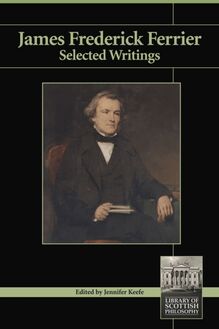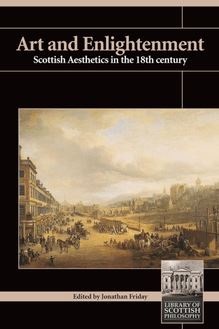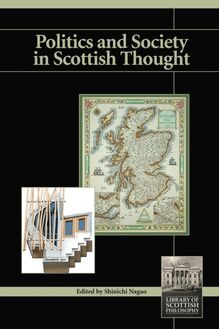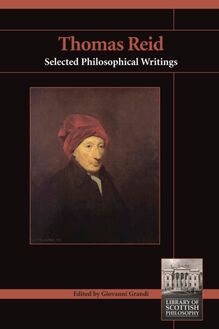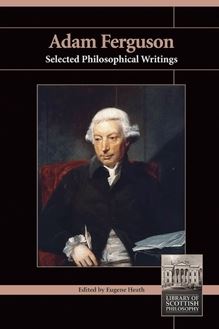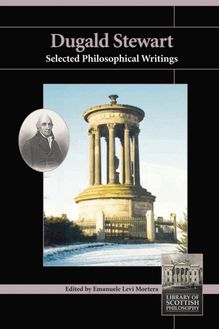Lord Kames , livre ebook
129
pages
English
Ebooks
2017
Vous pourrez modifier la taille du texte de cet ouvrage
Obtenez un accès à la bibliothèque pour le consulter en ligne En savoir plus
Découvre YouScribe en t'inscrivant gratuitement
Découvre YouScribe en t'inscrivant gratuitement
129
pages
English
Ebooks
2017
Vous pourrez modifier la taille du texte de cet ouvrage
Obtenez un accès à la bibliothèque pour le consulter en ligne En savoir plus
Publié par
Date de parution
31 janvier 2017
Nombre de lectures
3
EAN13
9781845409296
Langue
English
Publié par
Date de parution
31 janvier 2017
Nombre de lectures
3
EAN13
9781845409296
Langue
English
Lord Kames
Selected Writings
Edited and Introduced By Andreas Rahmatian
LIBRARY OF
SCOTTISH
PHILOSOPHY
IMPRINT ACADEMIC
2017 digital version converted and published by
Andrews UK Limited
www.andrewsuk.com
Copyright © Andreas Rahmatian, 2017
The moral rights of the author have been asserted.
No part of this publication may be reproduced in any form without permission, except for the quotation of brief passages in criticism and discussion.
Imprint Academic PO Box 200, Exeter EX5 5YX, UK
Full series details:
www.imprint-academic.com/losp
Series Editor’s Note
Volumes in this series do not aim to provide scholars with accurate editions, but to make the writings of Scottish philosophers accessible to a new generation of modern readers in an attractively produced and competitively priced format. In accordance with this purpose, certain changes have been made to the original texts: Spelling and punctuation have been modernized. In some cases the selections have been given new titles. Some original footnotes and references have not been included. Some extracts have been shortened from their original length. Quotations from Greek have been transliterated, and passages in languages other than English translated, or omitted altogether.
Care has been taken to ensure that in no instance do these amendments truncate the argument or alter the meaning intended by the original author. For readers who want to consult the original texts, full bibliographical details are provided for each extract.
The first six volumes of The Library of Scottish Philosophy were published in 2004 and commissioned with financial support from the Carnegie Trust for the Universities of Scotland. Subsequent volumes have been published under the auspices of the Center for Scottish Philosophy at Princeton Theological Seminary. This volume of Selections from Henry Home, Lord Kames is the eighteenth volume in the series. Portions of the text were prepared for publication by Christopher Choi, to whom a special debt of gratitude is owed.
The CSSP gratefully acknowledges financial support from the Carnegie Trust and Princeton Theological Seminary, the enthusiasm and excellent service of the publisher Imprint Academic, and the permission of the University of Aberdeen Special Collections and Libraries to use the engraving of the Faculty of Advocates (1829) as the logo for the series.
Gordon Graham,
Princeton, August 2016
Andreas Rahmatian: Introduction
1. Lord Kames’s Life and Works
The judge, jurist and philosopher, Lord Kames, a central figure in the Scottish Enlightenment, was born as Henry Home [1] on the estate of Kames in Eccles (Berwickshire, Scottish Borders) in 1696. We know little about his earlier life; most information we have is what he told James Boswell as an old man. Henry Home was educated at home and did not attend university. This fact not only indicates his father’s limited financial means, but also characterizes Kames’s later career as an advocate and, especially, a man of letters. Since he was mostly self-taught, which was not unusual in the eighteenth century, it may explain why his interest in all disciplines - aesthetics, moral philosophy, law, legal history and theory, sociology, anthropology, agriculture, economics and even physics - never became more confined. He felt no need to specialize because he was, and wanted to be, a polymath. In contrast to our times, he regarded overspecialization as perilous, particularly for those who aim to serve their country in public offices. ‘I venture to pronounce, that no man ever did, nor ever will, make a capital figure in the government of a state, whether as a judge, a general, or a minister, whose education is rigidly confined to one science.’ [2] Kames cannot be said to have excelled in the various sub-disciplines he worked on, but his attempt at combining these to arrive at a universal understanding of the world and its appearances was outstanding, and among the jurists he is unique in seeing law not as a separate construction of fairly logical rules, but as an inextricably linked part of history, philosophy, anthropology, sociology and even aesthetics. Without these, law could not be properly understood. There are many shortcomings in his overarching philosophical scheme, but there is much to be learned from them. They stimulate creative thoughts in the reader and uncovering the mistakes sharpens the reader’s mind. Kames made the law appear as a social and historical phenomenon and as a living body of mankind. With this interpretation of the law he is unrivalled up to the present day.
Kames’s independent research and scholarship were not shaped by the orthodoxies of established institutions of learning, and this enabled him to maintain a sceptical attitude to authorities of all kind, no matter how illustrious. This scepticism, often well-argued, sometimes less so, runs through all his work, in combination with a somewhat caustic style and a markedly distrustful view about the ‘good’ nature of man. Kames had a strong sense of the absurd, and enjoyed exposing the many irrationalities in religions and manners as they developed towards a modern society based on reason. He was an ardent promoter of the Enlightenment cause, especially in Scotland, relentlessly pursuing improvement in the arts, manners, law, technology and the economy. But, as his works reveal, he was far more than that. His contemporary neglect arises from the fact that Kames is very little read today. Philosophers see him as too specialist and ‘legal’. Lawyers regard him as out-dated (although occasionally Scottish courts still refer to Kames in their decisions). The general reader finds his books too extensive, discursive and disorganized. This selection from his writings aims to change all of these opinions.
It was only in his late thirties and into his forties that Kames became the promoter of Enlightenment ideas and the mentor of important younger thinkers. As a young man, Home obtained his legal education with a solicitor (Writer to the Signet) in Edinburgh. Being ambitious, he decided to train as an advocate, and he studied classics, French and Italian, literature and Roman law to prepare for the examination. He passed the examination and was admitted as an advocate in January 1723. Slowly and gradually his legal practice developed, which may have given him more time to study philosophy and to have intellectual exchanges with other men of letters, to publish his first work on law ( Essays upon Several Subjects in Law , 1732), and to apply (unsuccessfully) for a chair of Civil (Roman) law at Edinburgh University. He married rather late, in 1741, and had a son and a daughter with his wife Agatha Drummond. About this time some of the figures who would later be included among the greatest representatives of the Scottish Enlightenment became his protégés and élèves . Many of them remained friends with him for the rest of his life - David Hume (with some reservations), Adam Smith, Thomas Reid, John Millar and others.
A domineering and authoritarian manner, combined with argumentativeness, a sharp wit, a certain honesty, both intellectually and in personal life, and the rumour that he had sympathies for the Jacobites, may have delayed Home’s appointment as a judge. During the uprising in 1745 he wrote his first major work on law and legal history - Essays upon several Subjects concerning British Antiquities (published in 1747). It contains no endorsement of the Jacobite cause, but an interesting discussion of the constitutional position of Parliament and the king as a magistrate subjected to the law. [3] In 1751 Home published the first of his major works, the Essays on the Principles of Morality and Natural Religion . This was an important contribution to the developing ‘Common Sense’ philosophy of the Scottish Enlightenment. It sets out the basis of Kames’s thought and is the philosophical framework for all the disciplines he would later be concerned with - moral philosophy, aesthetics, law and legal history, philosophical history and sociology/anthropology. The Essays offer a critical reply to David Hume’s occasionalist idea of causation, his concept of justice as not a natural, but artificial (conventionalist, utilitarian) virtue, and his conventional (contractual) idea of property. [4]
In 1752 Henry Home was finally elevated to the Bench as Lord Ordinary of the Scottish Court of Session, and he took the title Lord Kames after his estate. In his early years as a judge he was subjected to intense criticism by the conservative branch of the Church of Scotland and came close to excommunication in 1755, because his Essays on the Principles of Morality put forward the idea that in a world determined entirely by natural laws our sense of free will is God’s benevolent deceit. [5] From the 1750s onwards, Kames published his other principal works: Historical Law-Tracts (1758), Principles of Equity (1760), Elements of Criticism (1762), Sketches of the History of Man (1774), and Elucidations respecting the Common and Statute Law of Scotland (1777). In his role as ‘improver’ Kames also wrote The Gentleman Farmer (1776), ‘an attempt to improve Agriculture, by subjecting it to the test of Rational Principles’, and the pamphlet Progress of Flax-Husbandry in Scotland (1766). [6] As an educator, Kames published the Introduction to the Art of Thinking (1761) and Loose Hints on Education, Chiefly Concerning the Culture of the Heart (1781). The most comprehensive of these works are the Sketches of the History of Man , a philosophical history of the progress of man which incorporates large sections from some of his earlier works. The sketches discuss the development of all aspects of human endeavour, and of
